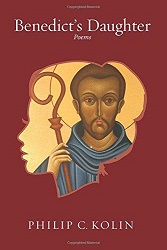Benedict’s Daughter: Poems

As I read Benedict’s Daughter, by Philip C. Kolin, I was treated to the talent of a veteran author who has already published several books of poetry. With poetic rhythm and stunning imagery, Kolin’s poems manage to get to the heart of the matter. With his gift of poetic sight, he is able to bring the reader along for a ride of heightened thought that reflects his Roman Catholic background and its traditions. He draws his inspiration from an inspiring woman and the natural world. His poems are prayers that create, in the reader, a longing for another world. His voice whispers that there is holiness in the ordinary, if we’re willing to look for it. Philip Kolin has the ability, through his poems, to give readers a peek into the life of a woman who dedicated all she had to the care of others. Her life was a life lived to its limits, a woman who gave all she had in order to serve Christ and his poor. Weighing only 87 lbs:
Midge
She was small, hardly
4 feet, 11 inches:
her lumbering brothers
teased her, calling her Midge,
for midget…
Kolin draws his inspiration from this spiritual friend whom he knew for over 40 years. Midge was a Benedictine Oblate who cultivated the life within, her ‘inner’ monk. (Oblates can be either laypersons or clergy, and are affiliated with a monastic community, comparable to the tertiaries associated with other orders.) She lived her life of love for God in the world of family and society.
A Holy Woman’s Obituary
…She baked bread for the homeless
and fed a table full of envelopes
begging for her rich mites.
She was a spiritual guide to many, in the spirit of St. Benedict’s Holy Rule. Kolin gives poetic expression to this life lived in God’s service, a life that embraced the spirituality and liturgical life of monasticism.
Oblates
They serve in monasteries
without walls or cloistered walkways,
the comforts of bells or vows,
the caress of cowls and veils.
Side by side with poems of her life, are others that reflect Benedictine traditions, such as: praying the Liturgy of the Hours, vows of stability (taken by the oblates), hospitality, and silence. This collection includes a variety of poetic forms, styles, and devices. These poems are set in the Delta; a region in northern Mississippi that lies between the Yazoo and Mississippi rivers and is known for its cotton and for blues music, and where poverty and economic mobility are worse than anywhere else in the developed world.
The Hour Christ Died:
…mealtime… in the long soup lines
… they know the black monks
will fill them with all good things…
one by one, the monks bless each
with a hyssop branch,
dipped in holy water.
Midge showered the love of Christ on those around her. Some came to her for spiritual food, and others came in poverty and desparate hunger. As I read, I kept thinking, wow, that was some lady- I wish I’d known her! I felt the urgency she felt, to not waste a single moment, life was too brief, and God is everywhere: something that Philip Kolin manages to capture in poetic images:
Day Opens:
The air is inscribed with Gospels
Calling us to be a part of forever:
The Angelus and Mass Bells,
The canticles of rivers and oceans,
And the blessings of soft-voiced breezes
All ring souls with delight.
God fills daybreak with himself.
Kolin’s accomplishments as a poet and an editor mark him as one of Mississippi’s important creative writers.
He is the Distinguished Professor of English (Emeritus) at the University of Southern Mississippi where he also edits the Southern Quarterly. He has written or edited 40 books, including seven collections of poetry, the most recent being Emmett Till in Different States: Poems.
You can buy this inspirational book of poetry at Wipf and Stock Publishers

